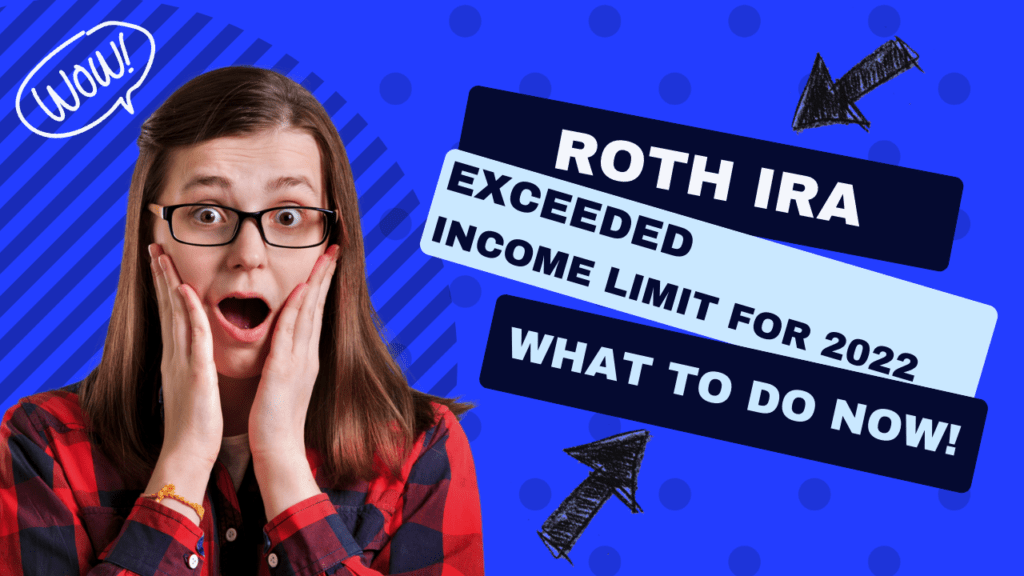Roth IRA Excess Contributions
After Selling Real Estate, the IRS says your “income” exceeded what is allowed for Roth IRA eligibility. In this article, we’ll outline what you need to do next. Whether you’re a DIY Investor or working with a full service Investment Advisor or CFP® Professional, the process is the same. The main difference if you are a “DIY” Investor is simply that you will Do It Yourself. Either way, if you need clarification or a little help, go ahead and book a Free CFP® Consultation by clicking here now.
Table of Contents:
-
Introduction
-
Understanding Roth IRA Contribution Limits
-
Roth IRA Contribution Limits for 2022
-
How Real Estate Sales Affect Roth IRA Eligibility
-
What Happens If You Exceed the Income Limit?
-
How to Fix an Excess Contribution
-
Recharacterizing a Contribution to a Traditional IRA
-
Backdoor Roth IRA
-
Alternative Retirement Saving Options
-
The DIY Investor Experience
-
The Full-Service Investment Advisor Experience
-
Conclusion
Introduction:
Investing in a Roth IRA can be an excellent way to save for retirement while benefiting from tax-free growth and withdrawals. However, contributing to a Roth IRA has income limits, and exceeding these limits can result in penalties and tax consequences. If you funded a Roth IRA and then sold some real estate, only to find that your income level now disqualifies you from contributing to a Roth IRA, the process of fixing the situation can be complex. In this article, we’ll compare and contrast the experience of a DIY investor versus a client working with a full-service investment advisor.
Understanding Roth IRA Contribution Limits:
Roth IRAs have income limits that determine who is eligible to contribute to them. In 2023, the income limits for individuals are $140,000 for single filers and $208,000 for married filers filing jointly. For 2022, the income limits for individuals are $139,000 for single filers and $206,000 for married filers filing jointly.
If your income exceeds these limits, you cannot contribute to a Roth IRA for that tax year.
How Real Estate Sales Affect Roth IRA Eligibility:
If you sell real estate for a profit, the income from that sale counts towards your income for Roth IRA contribution limits. Depending on the size of the gain, it’s possible that the income from the sale could put you over the income limit for contributing to a Roth IRA.
What Happens If You Exceed the Income Limit?
If you contribute to a Roth IRA but then exceed the income limit, you have made an excess contribution. Excess contributions can result in penalties and tax consequences if not fixed. The penalty is a 6% tax on the excess contribution each year it remains in the account. You must withdraw the excess contribution and any earnings on that amount by the tax filing deadline, including extensions, to avoid penalties and taxes.
How to Fix an Excess Contribution:
To fix an excess contribution, you must withdraw the excess amount and any earnings on that amount by the tax filing deadline. You may also need to file Form 5329 with your tax return to report the excess contribution and any related penalties. Alternatively, you can recharacterize the excess contribution to a traditional IRA if you’re eligible.
Recharacterizing a Contribution to a Traditional IRA:
Recharacterizing a contribution means moving it from a Roth IRA to a traditional IRA, which doesn’t have income limits for contributions. To recharacterize an excess contribution, you must contact your IRA provider and request a recharacterization of the contribution. You’ll need to complete the necessary paperwork and provide any required documentation.
The deadline for recharacterizing a contribution is the tax filing deadline, including extensions, for the year in which the contribution was made.
Backdoor Roth IRA:
If you exceed the income limits for a Roth IRA, you may still be able to contribute to a Roth IRA using a backdoor Roth IRA strategy. This involves making a nondeductible contribution to a traditional IRA and then converting it to a Roth IRA.
This Backdoor Roth IRA strategy can be complicated and may have tax consequences, so it’s important to consult with a financial advisor or tax professional before pursuing it.
Alternative Retirement Saving Options:
If you’re not eligible to contribute to a Roth IRA due to income limits, there are alternative retirement saving options available. These include contributing to a traditional IRA, a 401(k), or a SEP-IRA if you’re self-employed. These options have different contribution limits and tax implications, so it’s important to research them and consult with a financial advisor or tax professional.
The DIY Investor Experience:
If you’re a DIY investor, navigating the process of fixing an excess contribution or utilizing a backdoor Roth IRA can be challenging. You’ll need to research the options available to you, fill out the necessary paperwork, and ensure that you meet all deadlines.
This can be time-consuming and may require some knowledge of tax and retirement savings rules.
The Full-Service Investment Advisor Experience:
If you work with a full-service investment advisor, they can guide you through the process of fixing an excess contribution or utilizing a backdoor Roth IRA. They can provide expertise and support throughout the process, ensuring that you meet all deadlines and avoid penalties and taxes.
They can also help you explore alternative retirement saving options and develop a comprehensive retirement savings plan.
Conclusion:
Funding a Roth IRA can be an excellent way to save for retirement, but it’s important to understand the income limits and how they can be affected by real estate sales. If you exceed the income limits, there are options available to fix the situation, including recharacterizing the contribution, utilizing a backdoor Roth IRA, or exploring alternative retirement saving options.
The DIY investor experience can be challenging, but a full-service investment advisor can provide valuable expertise and support throughout the process.
Book your free CFP® Consult – Click Here Now








